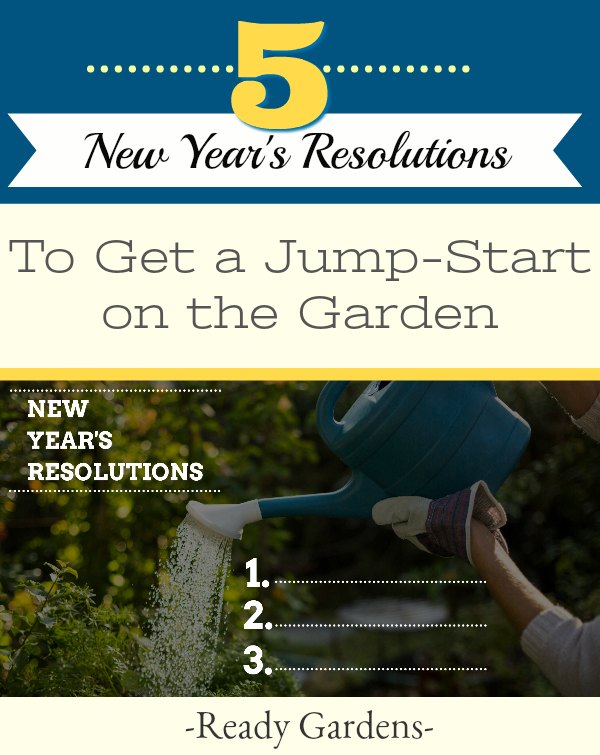While we welcome in a new year, I like to take some time to reflect on the past and start dreaming of a better future. And, of course, I implement this into my gardening as well. While I have the best intentions to have a thriving garden, sometimes mistakes are made. These mistakes, although innocently made, caused me to be more mindful of my gardening habits and I’ve grown into a better gardener from them.
A new year is a fresh start. The slate has been wiped clean and you can put your best foot – or green thumb- forward! Before you put in your next garden, it’s important to think about the goals you have for the coming growing season. And, now with the new year, comes new garden resolutions!
Shop For Non-GMO Heirloom Quality Seeds
5 New Year’s Resolutions To Get a Jump-Start on the Garden
- I promise to give my organic garden what it needs to prosper. For those interested in creating biodiversity in their future garden, you must start with the soil. Homemade fertilizers can be made using items you would normally toss in the wastebasket. Items like egg shells, banana peels, and used coffee grounds are perfect for making a nutrient-rich, full spectrum fertilizer that will slowly release the nutrients to the soil. Best of all, it’s so easy to make and use 10 readily available materials you would otherwise throw away. Another way to help your garden grow is by adding a compost bin to the garden. This is a great way to make use of brown and green items full of nitrogen and carbon-rich materials.
- I pledge to only use non-GMO seeds. It should be emphasized that if a person is purchasing seeds for long-term sustainability, then the seeds purchased should be non-hybrid (non-GMO) and heirloom quality. These types of seeds will produce fertile seeds that can be stored for future harvests. As well, consider only using organic fertilizers to ensure your plants are getting the best nutrients nature can provide.
- I’m going to make a garden plan and stick with it. To have a successful garden, you need a plan of action! Each year, I like to start by making a list of plants I want to grow. This helps me map out how much food I plan on growing for my family. Then, I research which plants can be planted in close proximity (i.e., lettuce, bunching onions, spinach) as opposed to those plants that need lots of space (pumpkins and melons) and then check to see which vegetables and fruits are companions to one another. Once I have researched, I start drawing out how my garden will look. This helps me stay on target for the space I allow the plants when I actually start planting my young plants.
- I’m going to start my seeds early. Rather than going to the garden center and paying an arm and leg for pre-grown plants, start early and grow your own. Check when your optimum growing time is for where you are located and begin around that time. You can also get a head start by making your own seed starting mix. This will not only save you money but also give your plants the best chance at growing hearty roots. The key to making a healthy seed starting mix is light, well-screened materials to promote root growth. By doing so ensures that the mix doesn’t compact in small seed starting cells/containers. Good moisture retention and drainage are also important considerations to keep in mind. Soils that are too moist can lead to damping off which causes pathogens to grow and kills or weaken seeds or seedlings before or after they germinate. Seeds need perfect growing conditions to grow healthy: water – allows the seed to swell up and the embryo to start growing, oxygen – so that energy can be released for germination, and warmth – germination improves as temperature rises.
- I promise to grow my seeds over winter to give them the best chance of growing. Choose your seeds carefully and in the coming months, many of you will begin the early stages of your gardening adventures by starting your seeds. Since the weather outside is still on the dreary side, this is the best time to get a head start on your future garden by starting the seeds indoors. Doing so results in earlier and longer harvests. This economic gardening method doesn’t require special equipment – just some moist soil, comfortable temperatures, and some TLC! Starting longer growing varieties like herbs, broccoli, cauliflower, and onions can greatly benefit from indoor growing methods. This gives the gardener a headstart and helps to control the growing environment.
These resolutions will no doubt inspire you to get into that gardening frame of mind and get growing! Some other garden goals you can add to your New Year’s Garden Resolutions are to take a gardening class in the spring, add some fruit trees to your garden, or encourage beneficial insects and birds to feel welcome by adding bird baths and flowers like coneflowers, roses, lavender.
Happy New Year, Friends!

